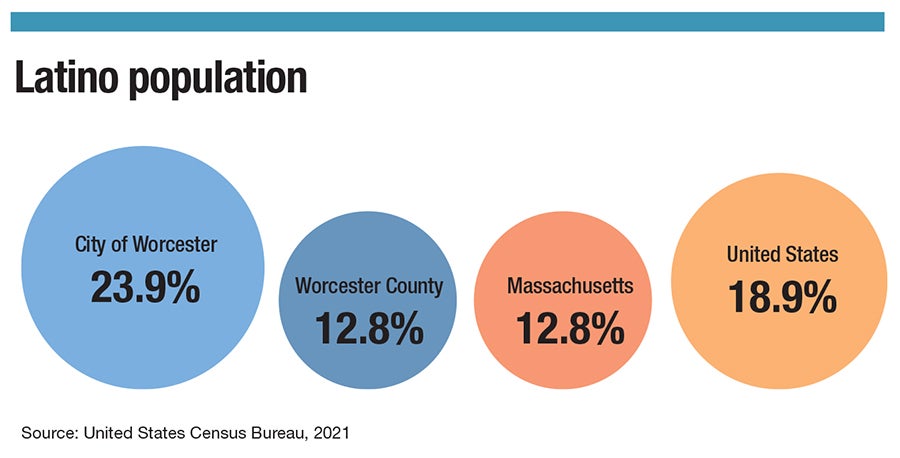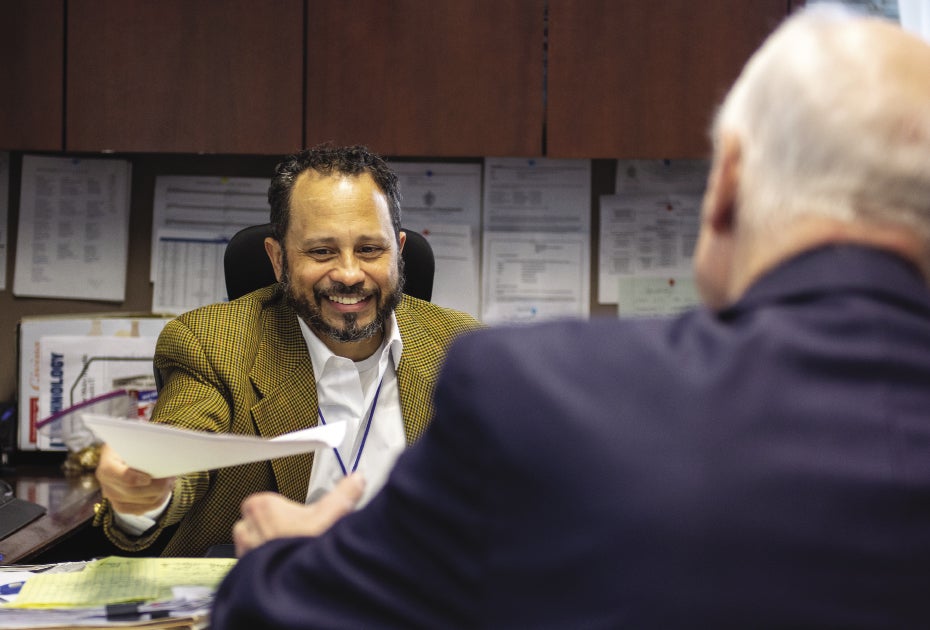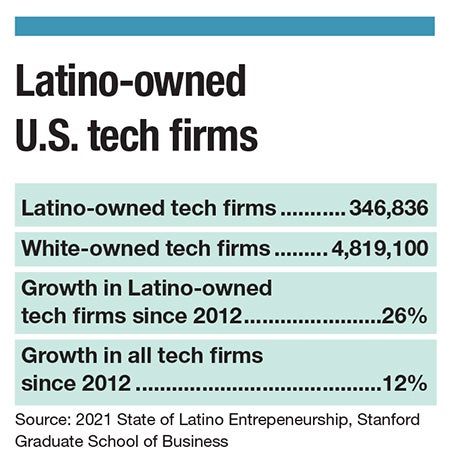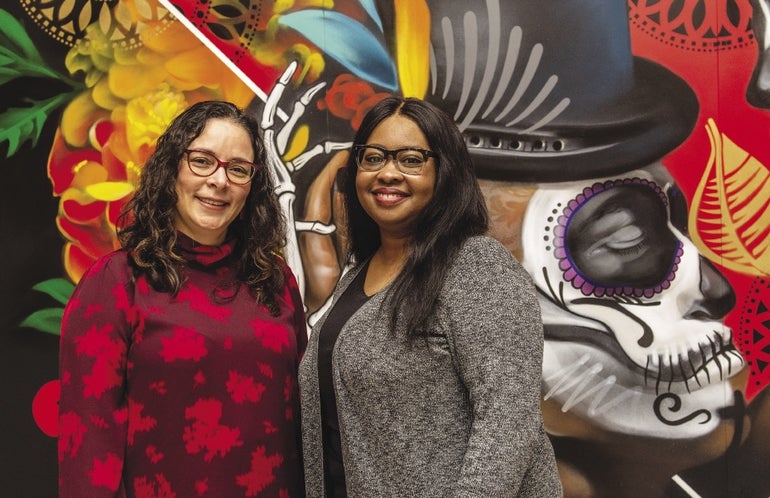PG Collaborative will allow entrepreneurs of color to come together, build relationships organically, and problem-solve issues unique to them.
Get Instant Access to This Article
Subscribe to Worcester Business Journal and get immediate access to all of our subscriber-only content and much more.
- Critical Central Massachusetts business news updated daily.
- Immediate access to all subscriber-only content on our website.
- Bi-weekly print or digital editions of our award-winning publication.
- Special bonus issues like the WBJ Book of Lists.
- Exclusive ticket prize draws for our in-person events.
Click here to purchase a paywall bypass link for this article.
In a city with as diverse a population as Worcester, a multitude of spaces should be dedicated for communities of color to gather in person, specifically a space where entrepreneurs of color can elevate their careers and affirm their identities. That’s what Valerie Zolezzi-Wyndham envisions, and she has plans to purchase a space this winter to turn that vision into reality.
Zolezzi-Wyndham, the founder and owner of Upton-based diversity, equity, and inclusion consulting firm Promoting Good, expects to have 10 business owners as permanent tenants at the space to be called the PG Collaborative, with open seating in the style of a coworking space for up to 40. This physical space will help minority business owners thrive in an environment created for them, something that is a rarity, she said.
“Important conversations will happen here,” Zolezzi-Wyndham said.
The space Zolezzi-Wyndam envisions will primarily house an incubator for creatives and entrepreneurs of color. She wants to buy a 2,500- to 4,000-square-foot building in downtown Worcester, and for reasons central to PG Collaborative’s mission, she won’t settle for renting a space. Buying, rather than leasing, will allow for autonomy, which is still lacking for communities of color.
The physical space will allow entrepreneurs of color to come together, build relationships organically, and problem-solve issues unique to them, which will all benefit their young businesses in a way they can’t with them now spread out across various spaces, she said.
“There’s a shared feeling of loneliness and lack of network as they grow their business,” she said.
Already on board as the first tenant is Shawna Curran, founder and CEO of STEM ENRG. Her Worcester company runs a cohort-based, six-month training program teaching coding, project management, and financial literacy for women of color.
“When she mentioned it to me, I just leapt. I almost jumped out of my chair. It was so refreshing and exciting,” said Curran.

A place to network
Throughout the U.S., Latinos are starting businesses at a faster rate than any other racial or ethnic group, according to a January 2022 report from the Latino Entrepreneurship Initiative at Stanford University in California. The number of Latino-owned businesses have grown 44% in the last 10 years, compared to 4% for non-Latinos.
PG Collaborative will be centered around people of color, not just Latinos, as it is designed to be a safe space where they can be free of discrimination and racism. Curran, who worked in tech before starting her own firm, said remote work during COVID provided relief for those who spent their careers codeswitching and tolerating microaggressions in the workplace.
“During the pandemic, working remotely, people of color found a lot of relief,” said Curran.
A return to the office meant a return to dealing with those slights on a daily basis. Curran said working at the PG Collaborative will help her and others avoid these draining situations while still reaping the benefits and networking opportunities available in a physical office space.
CENTRO Inc., a minority-led, community-based nonprofit in Worcester, is one physical place already existing with a goal of supporting self-sufficiency in the community. The PG Collaborative seeks to not be in competition with pre-existing organizations, but to add something more, said Zolezzi-Wyndham.

“There is something to be said of a need for additional space, no doubt,” said Juan Gomez, president and CEO of CENTRO.
This need exists despite the issue of diversity and inclusion entering conversations at increasing rates since George Floyd was murdered by Minneapolis police in 2020.
“There is a move to acknowledge disparities in communities of color as related to access to capital and opportunities to build, but the problems in accessing them are still there,” said Gomez.
Curran expects to build relationships with other entrepreneurs at the PG Collaborative, something she said has been a struggle in many business circles as a Black woman.
“For a long time, when I was trying to get this business off the ground, I did connect with a lot of entrepreneurs,” she said, “but I have always felt isolated and like there were topics I could not work through in those spaces.”

Curran specifically called out the lack of capital funding given to women of color, and how fellow entrepreneurs did not understand the motivation behind her company: to break down barriers for women like her. Every conversation, she said, would have to begin by establishing why the work was necessary.
“Here, I can skip that part and get to what I’m doing,” she said.
A place for community
Beyond serving as simply a workplace, PG Collaborative will permanently house Casita Cultural Latina, a cultural organization of which Zolezzi-Wynham is a founding board member. The group hosts events and seeks to be a unifying force in the Latino community in Worcester. Casita regularly commissions artwork from members of the community, and the PG Collaborative will offer that art a permanent home.
This place won’t be the first location for a community center of this kind in Worcester, but many that were once strongholds are no longer there.
“Casita is standing on the shoulders of so much work that the Latino community has done in Worcester,” said Raquel Castro, a co-founder of Casita.
Castro grew up in the Main South neighborhood and remembers amazing programming offered by community centers in her childhood.
“There were uniting spaces for new immigrant families,” she said.
Those spaces connected generations of people based on shared language and cultural background, but those kinds of places are now lacking. Castro’s family doesn’t know where to go for community-centered events, she said.
Having a “literal space really does help cultivate the emotional connections we are looking to create,” Castro said.
PG Collaborative will allow other business owners to do the same and have a professional place to take calls, host meetings, and invite clients. A general lack of coworking spaces, not just for people of color, in the city means many business owners take calls on the go and from their cars, said Zolezzi-Wyndham.
Curran is excited for the opportunity to have somewhere to bring clients and host her cohort, but she is particularly excited that Zolezzi-Wyndam is leading it.
“Valerie is so good at what she does,” said Curran. “She knows very well how to set up a space that is welcoming, open, vibrant, and inclusive.”
Promoting Good, Zolezzi-Wyndham’s business, partners with clients to teach equity leadership and ensure implementation of specific plans for businesses to better perform in the areas of diversity and inclusion, with clients such as UMass Memorial Health, the largest employer in Central Massachusetts. Her five-step model for building a better workplace includes customized plans, enactment, and monitoring of how a company reacts to the DEI work. Now in its fifth year, Promoting Good and its employees are fully remote, something Zolezzi-Wyndham hopes to change with her vision of a dual community center and coworking incubator.
A place of their own
The opening date for the PG Collaborative is still up in the air. Real estate has been more of a challenge than expected, Zolezzi-Wyndham said, but ownership is still the bar to be met. She still is on the hunt for the physical space, which she wants to be in downtown Worcester, although Zolezzi-Wyndham declined to share how much she is willing to pay for the home of the PG Collaborative.
“We are so often in borrowed spaces where we are not able to set the rules,” said Zolezzi-Wyndam. “It’s important for the community for real estate to be owned by a person of color.”
Zolezzi-Wyndam expects to earn revenue on the space via rent from tenants, as well as utilizing it for events such as quinceañeras. Zolezzi-Wyndam wants to use the space to grow her own company, too, and launch a DEI training program for the public.
Castro echoes Zolezzi-Wynham on the importance of owning the space. While Casita has partnered with other organizations advantageously, she said, having somewhere that is not controlled by another business will be an affirming change.
“All those spaces come with negotiating how much of our identity can be on display,” said Castro. “It’s frustrating to hear: We love what you're doing, until Friday. We love the art, but please don't let it touch our stuff. We love the community being here; please make sure they leave by five o’clock.”
Showcasing elsewhere means the Casita artists and community members live by the whims of others, she said. The PG Collaborative will allow for the autonomy they have been needing and missing.

